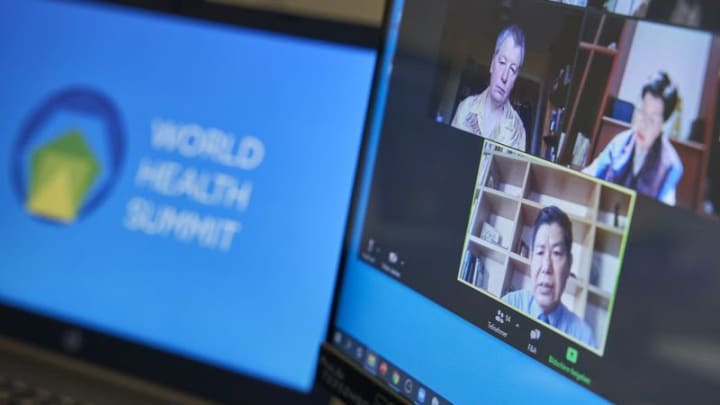
BERLIN — Representatives from the global south used this year’s World Health Summit to send a message to their counterparts in richer countries: They have a vision for how to emerge from the COVID-19 pandemic, and while they welcome advice and technical expertise, they are not interested in being told what to do.
The summit, one of the first major global health gatherings since the pandemic began, offered an opportunity for a stock-taking of just how severely the crisis has undermined global health goals. Officials detailed the setbacks they have sustained.
Fawziya Abikar Nur, Somalia’s minister of health and human services, described worrying declines in routine health care services, including vaccinations and facility-based deliveries, because of COVID-19. Somalia is now anticipating a 13% rise in child mortality this year.
“This is a huge concern about how we will recover from the secondary impact of COVID-19,” she said.
Is COVID-19 magnifying colonial attitudes in global health?
As countries around the world struggle to contain the coronavirus, inequalities brought about by existing imbalanced power structures are resurfacing, resulting in growing calls to decolonize global health.
A consensus emerged at the summit on the need to restore the focus on achieving the ambitious health-focused targets of the Sustainable Development Goals, even while combating a resurgent virus. Nur underscored a pressing need for global assistance if lower-income countries are going to succeed in these efforts.
But she also wanted to make sure that national leaders are able to deploy the funding based on their own understanding of their contexts and needs.
“The [donor] agencies need to align their actions in support of the government and engage in a way that the government’s mechanisms and structures ... are not fragmented or weakened,” she said.
In Somalia’s case, that means filling gaps in the delivery of the essential package of health services, particularly immunizations. In Tajikistan, Gafur Muhsin Muhsinzoda, first deputy minister of health and social protection, said the priority is shoring up the primary health care system. And Pakistan is looking for support for its universal health coverage package, particularly in extending it to more remote communities.
“What [the] government has requested is donor coordination at a multinational level,” said Malik Muhammad Safi, Pakistan’s director-general of health. “Through that, we try to align all the support.”
Setting an agenda does not mean crowding out guidance or advice. Officials across the global south expressed an eagerness to draw on the experiences of others as they continue to combat COVID-19, as well as building the capacity to prevent or respond to future pandemics and other health needs.
“We don’t want to make the same mistakes that others have made,” said Ahmed Ogwell Ouma, deputy director at the Africa Centres for Disease Control and Prevention. Founded only in 2017, Africa CDC has rapidly developed as it has taken on the role of coordinating the continent’s COVID-19 response. “Other organizations have gone through the same things and we can learn from them.”
He pointed out, though, that learning might go both ways.
“We are utilizing the lessons we’ve learned, not only from the Ebola crisis of 2014-2016, but also the many outbreaks that face us on a daily basis on the continent,” he said. That expertise may have played a role in keeping COVID-19 infection rates far lower than predicted across sub-Saharan Africa.
Donors and multilateral agencies may be getting the message.
The German Federal Ministry for Economic Cooperation and Development hosted a session to feature its German Epidemic Preparedness Team, known as SEEG — a rapid response unit that deploys to partner countries to assist with detecting outbreaks, while also offering policy and technical advice.
SEEG waits to be invited by the partner country and the specific assistance it offers is responsive to contextual needs, according to Michael Nagel, an epidemiologist on the team. It has deployed 32 times since the pandemic began, and each mission has been completely different.
“We always try to work closely with partners and try to be totally transparent,” he said.
On a broader scale, there is a growing collaboration between multilateral agencies that might make it easier to support country strategies, said Muhammad Ali Pate, director of the Global Financing Facility. He pointed to the launch last year of the Global Action Plan, which brought together 12 multilaterals to streamline their efforts to achieve the health-related SDGs, and the accelerated collaboration necessitated by the COVID-19 response.
“Global collaboration is not for global collaboration, itself,” he said. “It is global collaboration to work for countries.”
While pushing for more autonomy to drive their domestic agendas, global south officials emphasized that donors and multilaterals retain a critical role in guiding strategies that transcend national borders.
That includes improving technological access so that countries are able to take advantage of digital health innovations and driving cross-border health protection and promotion efforts, Tajikistan’s Muhsinzoda said.
Along with local civil society and community-based groups, Peter Sands, head of the Global Fund to Fight AIDS, Tuberculosis and Malaria, cautioned that multilaterals and donors might also have a role in ensuring that marginalized and vulnerable populations are included in government strategies.
“We also have to pick up on the fact that not all countries pay attention to all their communities,” he said. “We need to put a particular focus, both in the COVID response and the broader agenda, of reaching out to those who are furthest behind.”




